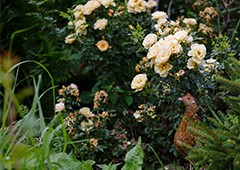There have been countless heartfelt pop songs, power ballads and rock anthems sung about roses and all the things that they represent- they’re synonymous with old-fashioned and down-the-line romance. They hark back to a time when men would appear on a woman’s doorstep wearing a corsage and clutching a bouquet of these luminous little beauties. Please allow me however to boldly suppose that the only thing more romantic than a bouquet of red roses, is in fact a bucket of red roses that you can proudly claim to have grown in your very own garden. Growing roses isn’t easy - we’ve all heard that at one point - but that is no reason not to try. So, if you are interested in a few handy tips, hints and the occasional wisdom that should come in handy as you try and get these delicate little babies to bloom, be our guest...
Location, Location, Location
Roses, like tourists cruising around Bondi Beach, absolutely love the sunlight. Though roses may have a reputation for being delicate and temperamental, that is no reason to grow them in a nice shady corner of your garden. Roses demand the sunlight - or should I say spotlight! Point being- it’s essential that you give your roses top billing! Most roses require six hours of direct sunlight everyday. So take the time to carefully map out the sun patterns across your garden. It’s beneficial for most roses to have some time to cool off in the afternoon. It would be best if you can find a spot in your garden that gets about six hours of direct sunlight during the day and a little shade throughout the afternoon.
Also, be aware of big trees stealing your roses thunder! Plant your roses at least three to four metres away from larger trees that will both sap your roses of their water, as well as interfering with their root growth.
It’s All In The Soil
It’s not uncommon for avid green-thumbs to become a little obsessed with the quality of their soil. They compost, they fertilize, they test the PH levels - there are all sorts of things one can do to imbue their soil with the necessary magic to grow anything and everything. For roses, it is recommended that you use a sandy loam soil. Loam, in case you didn’t know, is a type of soil containing a mixture of clay, sand and silt particles, plus an appropriate supply of organic matter and plant nutrients. Ask at your local garden supply store for a loam soil that is a little on the sandy side, and they should be able to point you in the right direction. Additionally, it is recommended that you keep the soil ideally at a PH level of 6.5, so it has just that little bit of acidity that improves the growth of your roses.
Won’t Somebody Bring Me Some Water
Unfortunately for rose loving Australians, roses aren’t particularly tolerant to drought like conditions. Ideally your roses should drink approximately an inch of water per week. The thing to remember about this, is that it’s best for the water to soak deep into the soil, which promotes strong root structures. There are two things that can help you as you try and meet the watery demands of your roses.
-
Purchase yourself a soaker hose. A soaker hose is an easy way to ensure that your roses are getting a healthy amount of water everyday, without completely drowning them. The soaker hose gradually releases water around the base of the plants, which will give the water enough time to slowly seep deeper and deeper into the soil.
-
Make sure you regularly coat your soil with mulch. Mulch helps to keeps your soil moist whilst simultaneously defending against weeds. It is recommended that you use Lucerne hay, straw, grass clippings or dry cow manure, as opposed to pine bark for mulch.
The key wisdom in all of this is that your soil should remain hydrated and healthy, but at the same time there is danger in over watering your plants. That’s why it’s best to coat your soil in mulch and use a soaker hose, as the soaker house will slowly release water and the mulch will keep it in the soil for longer.
Prune To Show You Care
As they say, time in the garden equates to roses in the vase. It’s recommended you spend at least one to two hours in the garden per week. “What on Earth do I do for one to two hours” I hear you bemoan. One option is to get pruning and deadheading your roses. You may believe that the bigger the bush, the larger and more bountiful the roses - let me insist upon you, that this is simply not the case. Controlling your rose bush through regular pruning and deadheading promotes healthy and productive growth. Allowing your roses to grow wild and free will only result in wasted energy and very few quality roses. Prune your rose bush right back and don’t be afraid to deadhead any sprouts that look unhealthy or unlikely to grow. If you can bring yourself to be ruthless with your roses, chances are you may have more garden success in the future.

Be Cautious With Performance Enhancing Fertilizers
Fertilizers are great, but if misused they can genuinely damage, or worse, kill your roses. Do be cautious and follow the instructions specific to the fertilizer you are using. Please don’t make the mistake of believing more fertilizer equals more roses. Over-fertilizing your roses can be counterproductive. If you are feeling antsy about the state of your garden, invest your time into ensuring your soil is top notch. Overcompensating with fertilizer may be a knee jerk reaction and the root cause of the problem - if there is any - may still go undetected.
One great organic alternative for fertilizer is eggshells. Eggshells will help strengthen the plant tissue, which in turn will promote strong healthy leaf and petal growth. Make sure you crush your eggs shells right down, before sprinkling them along the soil at the base of the plant.
Hopefully, with patience and perseverance, you will soon discover some exquisite roses blooming proudly in your garden. If your approach isn’t working do not despair, there are many people out there willing to share their tips, hints and tricks - so don’t be afraid to ask. Gardening stores and decent online forums are great places to pick up quirky little bits of advice. So long as you get the basics right, you should be reaping the benefits in no time!
One great way to get your garden soil on the right path is to get yourself a couple of chickens. Chooks are like little green thumbs and are all too willing to help improve your soil to promote the growth of beautiful flowers, especially roses.


















